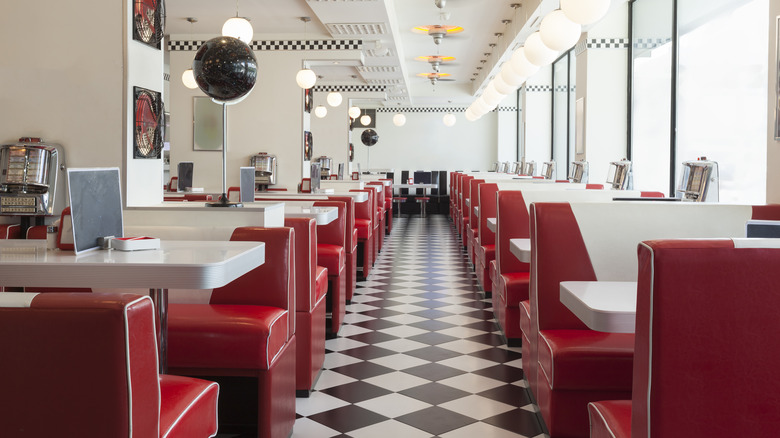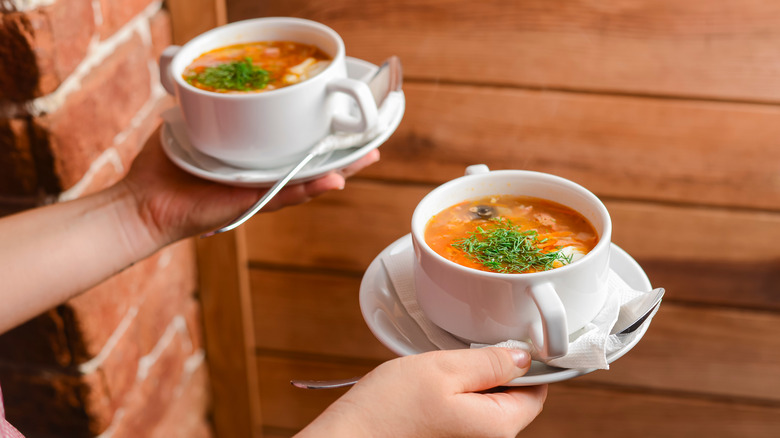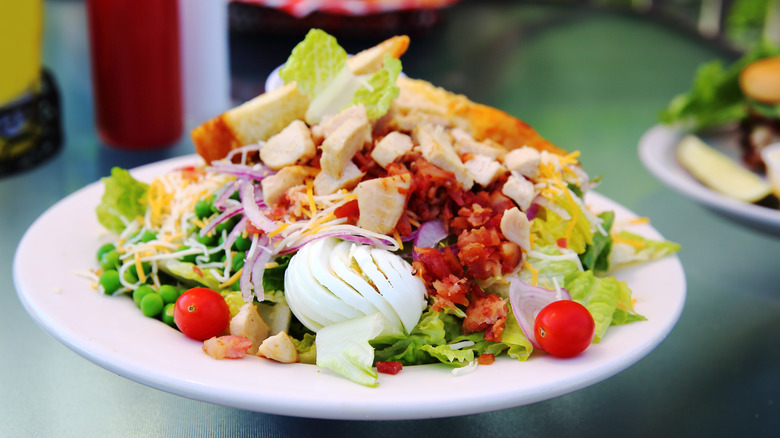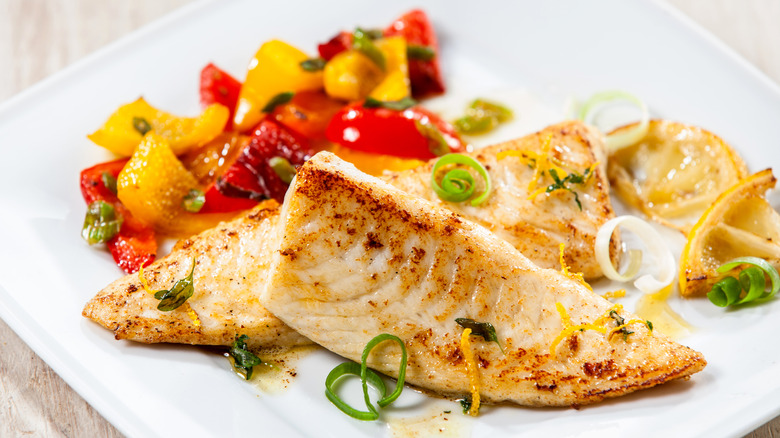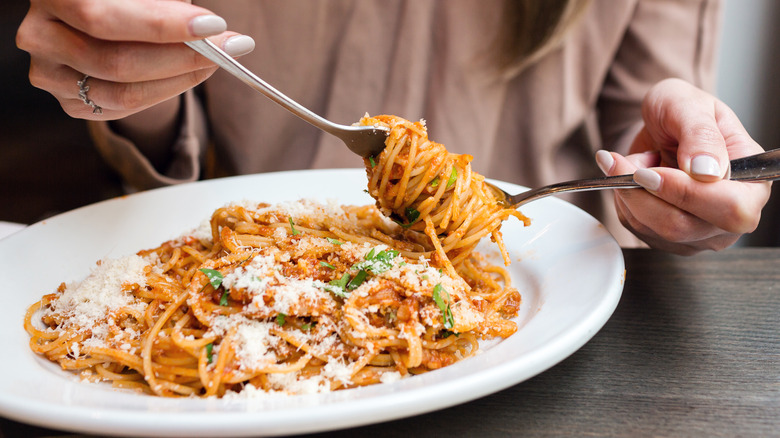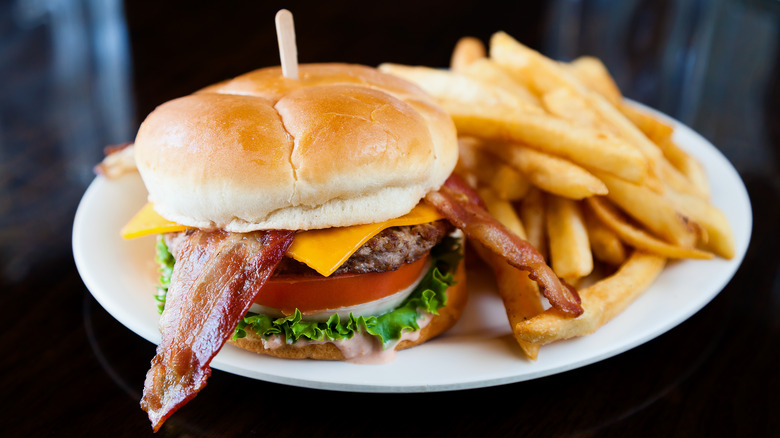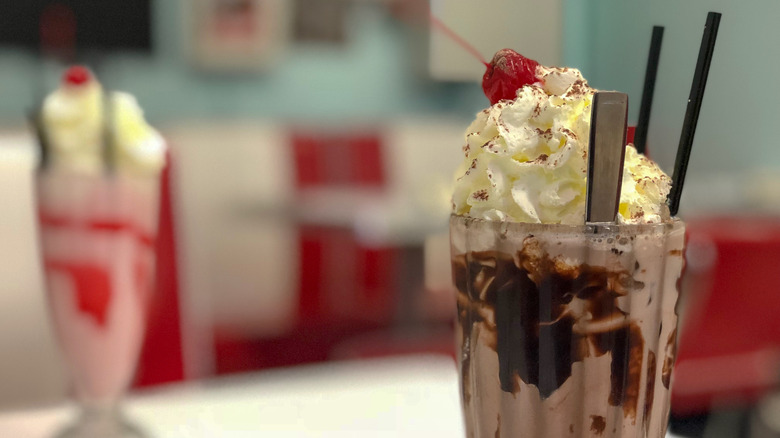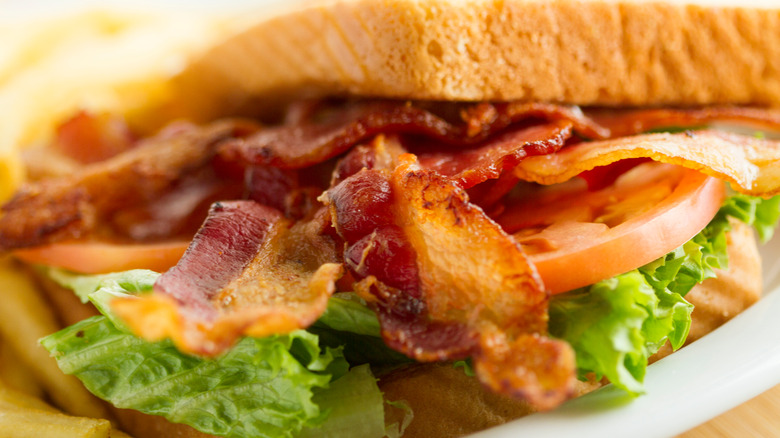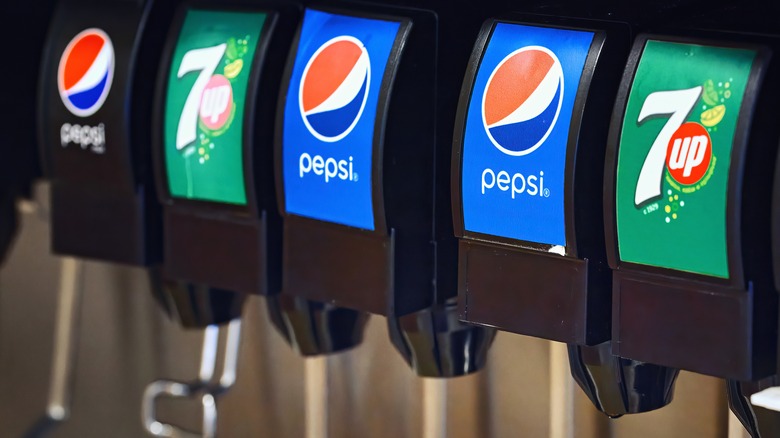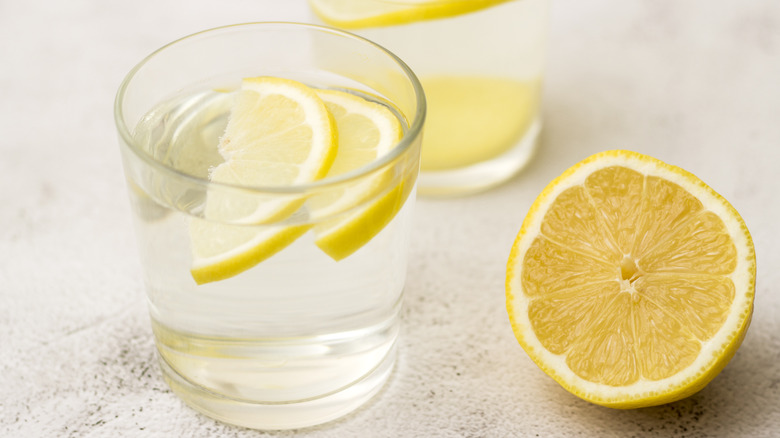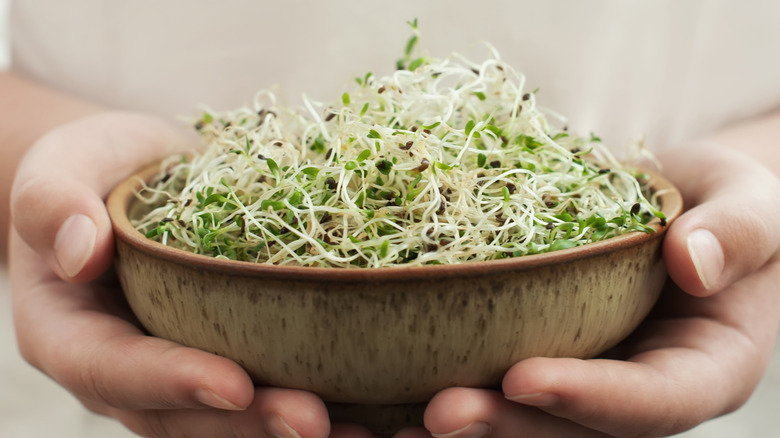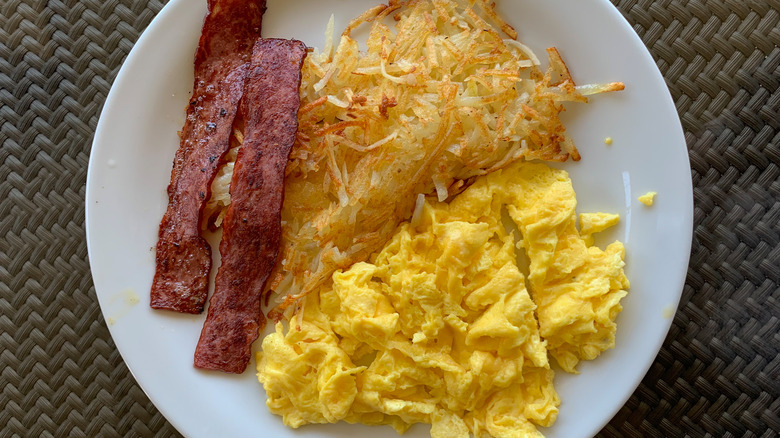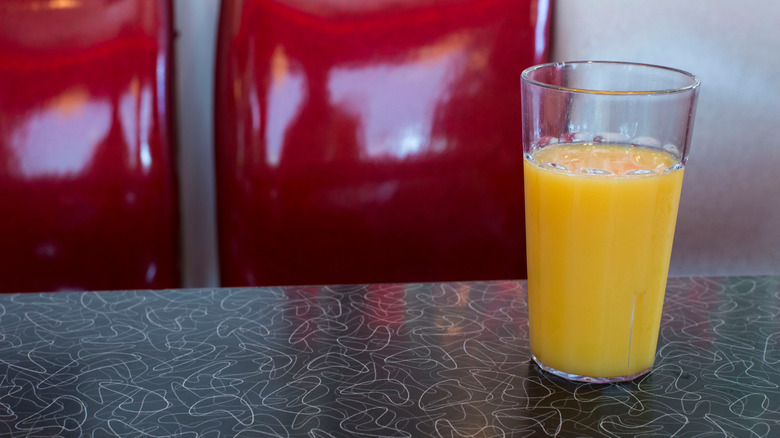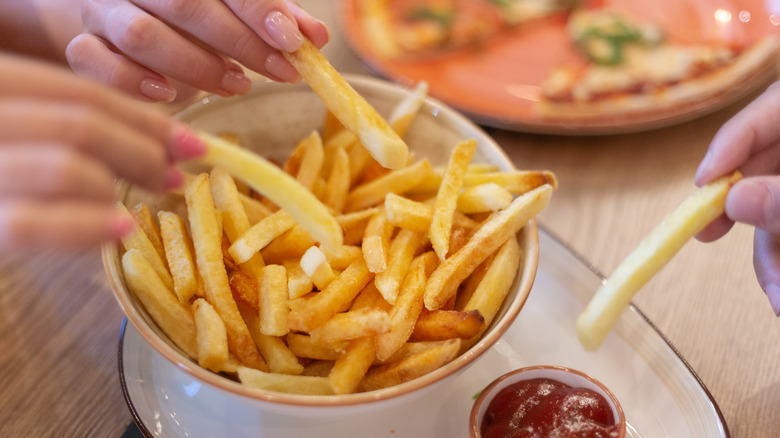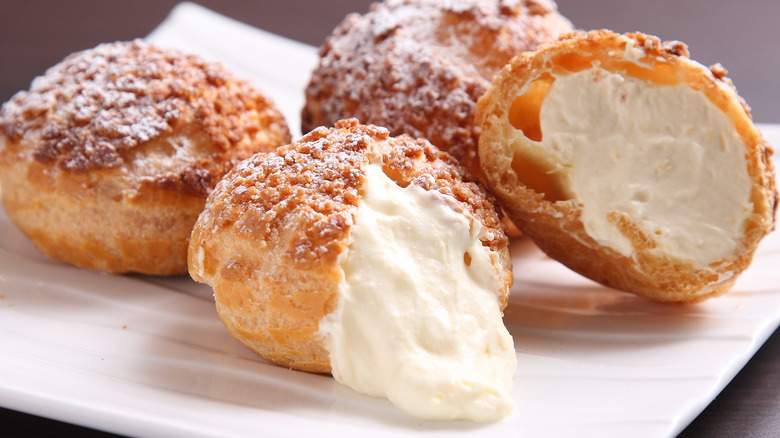14 Diner Foods You Should Consider Avoiding
Diners are an American invention. They started out in Providence, Rhode Island in the late 1800s as a night lunch wagon, a place to grab inexpensive food after dark. They were popular with people who worked the late shift. They eventually became known as rolling restaurants, when a few seats were installed on the wagon. These mobile kitchens soon became known as dining cars, a term that eventually was shortened to simply, "diner" (via Smithsonian).
Maybe it's the counters and stools, the leather booths, or the round-the-clock service, but going to a diner is definitely an experience. Whether you're popping in after a night out, sitting down for brunch, or just stopping in for a snack, you'll have a lot of delicious options to choose from.
Eating at a diner is typically a delicious experience. Still, not every item on the menu is a good choice. Read on as we help you navigate the menu because there are at least 14 diner foods you should consider avoiding.
Stay away from the soup
Soup is a great comfort food that can warm you up anytime, especially when the weather is cold or dreary. The soup menu at a diner can be extensive: French onion, clam chowder, vegetable soup, cream of broccoli, split pea, potato soup, and more. But before you order a cup (or bowl) of soup the next time you head to the diner, think twice.
The idea of a soup of the day is that ingredients leftover from yesterday's chicken dinner might be today's chicken noodle soup. But that may mean that soups are just scraps left over from preparing other dishes. Chef and "Hell's Kitchen" star Gordon Ramsey is wary of ordering soup at a restaurant since it may be day old, or older. "Ask what yesterday's soup du jour was before today's special," he told Town and Country. "It may be the case that it's the soup du month."
Even if you order the soup, it might not be made fresh or on the premises. "Unless soup is one of their specialties, most diners just use the canned stuff," chef Heloise Blaure told Insider, noting it takes too much time to make soup on-site, and every day.
Skip the salad
Salads from a diner are notoriously large and loaded with meats like ham, bacon, and chicken, as well as toppings including hard-boiled eggs, bacon, croutons, and veggies. Then add on popular dressings like ranch, blue cheese, Caesar, thousand island, or a vinaigrette. Sounds good, right?
Maybe, but maybe not. It's the main ingredient — lettuce — that's potentially troublesome and something to worry about. Often, diner salads are sitting around for a while and may not be fresh. "One thing I would stay away from is a diner salad," Nick Liberato, chef and host of the Netflix show "Restaurants on the Edge," told Insider. "They're usually precut with some mass-produced dressing that's not made in-house." If you want something light that's still filling, consider ordering oatmeal, Greek yogurt, or cottage cheese, with a side of fresh fruit. A wrap or a quinoa bowl are two other options that are fresh, tasty, and satisfying.
Forgo the fish
You can order a lot of delicious foods at a diner, so why are you ordering fish? If you want a high quality, fresh fish, go to a seafood restaurant, not a diner. Here's why: For starters, it's probably not fresh. "Seafood at a diner is a bad idea. It's unlikely to be fresh-caught and a lot of diner seafood is probably deep-fried to cover up how terrible the quality really is," chef Nick Liberato, who's also host of the Netflix show "Restaurants on the Edge," told Insider.
You need to be careful about raw or undercooked fish too. The Centers for Disease Control and Prevention (CDC) warns that you shouldn't eat an oyster that smells, looks, or taste different from other oysters because it could be contaminated with vibrio bacteria, which can make you sick. A diner is probably not the best place to get sushi either. That's because there's a higher risk of foodborne illnesses — especially if you're pregnant, older than 60, or in a high-risk group — when you consume raw or undercooked fish or shellfish including sashimi, shrimp, or crab (via FoodSafety).
Say no to pasta
Whenever we went out to eat at a restaurant when I was a kid, my mother would always tell me to not get something I could eat at home, like spaghetti. That advice still holds true which is why it's not worth it to order pasta at the diner.
A diner on Reddit agrees, saying he could easily make pasta at home: "Some restaurants make their own, I just don't find that compelling enough to dine out. If I'm going out, I'm getting something better than pasta."
If you do order pasta at a diner, don't expect homemade pasta or sauce. "If you order a plate of spaghetti or a bowl of ziti, be prepared for it to come dressed in store-bought sauce," chef Heloise Blaure told Insider. "There's not necessarily anything wrong with that, but you can get a better meal for your money by ordering something else."
Burgers can make you sick
A burger and fries is a classic American comfort meal. And diners have some tasty burgers including cheeseburgers, pizza burgers, chili cheeseburgers, Mexican burgers, bacon burgers, and more. Just make sure the meat is cooked enough to kill bacteria. Ground meat like burgers should be at least 160 degrees which in food lingo is medium, while well done is 170 degrees (via Minnesota Department of Health).
Still, some germs can't be cooked away. Tainted meat is a real thing. Consumer Reports bought 300 packages of ground beef — typically the main ingredient used in making burgers — and tested them for five common types of bacteria. All of the samples they examined had fecal contamination, such as e. coli; 20% had C. perfringens which causes food poisoning, and 10% had S. aureus bacteria, which can't be killed even when cooked. Finally, one percent had salmonella. "For every case of E. coli O157 that we hear about, we estimate that another 26 cases actually occur," Hannah Gould, Ph.D., an epidemiologist at the Centers for Disease Control and Prevention (CDC) told the magazine.
Milkshakes could have listeria
Often, a diner run is an indulgence, filled with lots of treats, like milkshakes. We're drooling thinking of all the milkshake options like Oreo cookie, chocolate, classic strawberry, banana peanut butter, and more. Those milkshakes may be tasty but are they safe to drink? The ice cream used to make the milkshakes could be contaminated with listeria, a bacterium that can cause upset stomach, fever, and muscle aches. It's particularly dangerous for pregnant people, older adults, and anyone with a weakened immune system.
While the chances of contracting listeria from ice cream are pretty rare, it happens. In 2022, 28 people across 11 states got sick from ice cream contaminated with listeria (via CDC). There were two cases of listeria in 2014 and another person got sick in 2015 in Seattle — after all three, who had weakened immune systems, consumed milkshakes made with a commercial ice cream product — while they were hospitalized at the University of Washington Medical Center (UWMC).
Dr. Jeff Duchin, health officer for Public Health – Seattle and King County told KIRO 7 News, "... the Listeria bacteria were present in the milkshake machine where they contaminated the milkshake that was consumed by the recent case. Listeria can survive for long periods despite efforts to clean and sanitize food-processing equipment. UWMC cleaned and sanitized their machines twice weekly, which is not as frequently as is recommended."
Avoid processed meats
Thinking of ordering a BLT on your next diner run? Ordering sausage with your eggs, a club sandwich loaded with ham and bacon, or a hot dog loaded with toppings? Think again.
Before you order processed meat at the diner, consider going meatless. Here's why: Eating processed meat including bacon, sausage, hot dogs, and ham, has been linked to an increased risk of cancer and death. The World Health Organization classifies processed meat as GROUP 1A, which is carcinogenic to humans. "Research shows that eating processed meats like bacon and cold cuts can increase your chances for stomach and colorectal cancer," Lindsey Wohlford, an employee wellness dietitian told MD Anderson Cancer Center.
So, while bacon, ham, sausage, or a hot dog may sound like a good choice at the moment, consider skipping them and ordering another protein, like grilled chicken or roast turkey breast. Or go meatless by ordering a veggie bowl.
Don't order drinks from the soda fountain
Whether it's a cola, orange, ginger ale or another soda, fountain drinks at the diner can be very refreshing. But like milkshakes, (see previous), fountain drinks may be loaded with bacteria. Not very appetizing, huh? A biology professor who sampled 30 fountain drink machines in Virginia found almost half of the samples were contaminated with bacteria including E. coli, candida, klebsiella, and others. Through her research, she concluded the drink machines were the source of the bacteria, not the individual drinks. However, all of the restaurants reported cleaning the drink nozzles every day.
The researcher encourages restaurants to clean out soda fountains regularly, but she cautions that most restaurant employees probably don't know how to do that. Still, health experts aren't surprised about the bacteria. "Wherever man is, there will be representation of feces," Philip Tierno, director of Clinical Microbiology and Immunology at New York University Langone Medical Center, told ABC News. "We're basically bathed in feces as a society," he said. The next time you're considering a diner soda, ask how often they clean the dispenser. You might consider ordering drinks without ice too since ice dispensers can also be problematic. Hygiene Food Safety says germs like norovirus, E. coli, and salmonella can live on ice cubes.
Be leery of lemons in your drink
Here's a tart warning: You might want to skip the lemons in your ice water or in your iced tea. That's because those citrus slices and wedges may be contaminated with salmonella. Lemon and lime are typically cut early in the day by kitchen staff and often sit for long periods of time, either on ice or at room temperature. But if the employees who cut the fruit don't have good hand-washing habits, it could get contaminated and that contamination can grow throughout the day.
A study published in Food Protection Trends looked at what happens when lemon and lime slices were held at room temperature, versus on ice, or refrigerated and then transferred to a drink. The study concluded that improperly handled lemon or lime wedges could transfer foodborne illnesses such as salmonella. However, if the citrus slice is iced or refrigerated, it is at decreased risk of salmonella growth.
Stay away from alfalfa sprouts
Alfalfa sprouts can be healthy. WebMD says they're rich in vitamin K, high in fiber, and can help lower blood sugar, and lower cholesterol. But while diner salads and sandwiches may be topped with alfalfa sprouts, it might be a good idea to stay away from them.
According to Food Poisoning News, sprouts are one of the most dangerous raw vegetables to consume because the risk factor for bacteria is so high. That's because sprouts are native to warm conditions where bacteria can multiply. And even if the sprouts are washed thoroughly before they're eaten, germs like E. coli and salmonella can still thrive. For example, in December 2022, the U.S. Food and Drug Administration investigated an outbreak of salmonella infections that were linked to alfalfa sprouts sold in stores and served at restaurants. The sprouts were recalled and the outbreak was responsible for 15 illnesses and two hospitalizations.
Say no to powdered eggs
From omelets, to eggs Benedict, to scrambled eggs, to breakfast wraps, eggs are a star ingredient at a diner. You'd probably think the eggs are cracked fresh, right? Maybe, but maybe not. Former restaurant workers share their insights into restaurant eggs in this thread on Reddit, saying often scrambled eggs are made using cartons of liquid eggs. Another waiter, Jake Blanton, told Reader's Digest, "Even at the best breakfast buffet in the world, 99 times out of 100, the big pan of scrambled eggs is made from a powder."
While powdered eggs don't sound too appetizing, often diner customers don't even know because the juevos taste OK. But with the price of eggs these days, it makes sense that restaurants would look to save some money by buying the powdered stuff, which are dehydrated and have a longer shelf life compared to fresh eggs. Not sure if your dish is made with real eggs? Ask the waiter how the menu item is prepared, and ask for fresh eggs to be used.
Think twice about ordering fresh squeezed juice
Looking forward to ordering a freshly squeezed juice at the diner? Whether are you are ordering a mimosa or just want juice with your breakfast, make sure the juice is pasteurized — heat treated — to kill bacteria. Be sure to ask your server if the juice is pasteurized, and make sure it's stored and served cold, which helps slow the rate at which bacteria grows.
While most healthy people have a strong enough immune system to not get sick from freshly squeezed juice, some people can get sick, including children, older adults, people who are pregnant, and anyone with a compromised immune system. The FDA says unpasteurized juices need to have a warning label explaining the juice is not pasteurized and could have harmful bacteria. But, that FDA warning doesn't apply to single-serve juices, like a glass of freshly squeezed orange juice or grapefruit juice served at a restaurant.
Limit or avoid diner foods with trans fat
Craving fried food from the diner? That's easy to do when the menu is loaded with greasy goodies like french fries, tater tots, mozzarella sticks, onion rings, and more. But the problem is all of these snacks and sides can have artificial trans fat, a type of unsaturated fat that has significant health impacts. It's tough to eliminate trans fats completely from your diet. But it's definitely easier at home when you can read labels and avoid foods with "partially hydrogenated vegetable oil" — the key ingredient in trans fats.
According to Healthline, trans fats can increase your cholesterol, may be linked to an increased risk of developing heart disease, and are linked to inflammation in the body. The Food and Drug Administration (FDA) says trans fats are not generally recognized as safe, which is why they're banned from processed foods in the United States. Still, the FDA does allow trace amounts — under 0.5 grams of trans fats per serving. But what happens if you have more than one serving? For example, a serving of french fries may be nine fries, but who's eating only nine french fries at a diner?
Avoid cream pastries
One of the best parts of your diner experience can be getting dessert. But you might want to pass on any items that have cream, like a cream pastry. That's because cream can be contaminated with S. aureus, commonly known as staph food poisoning.
According to the CDC, foods that aren't cooked after being handled, including pastries and puddings, are at risk for staph poisoning. The best way to prevent staph is to make sure that food is handled by employees who have washed their hands, are wearing gloves, and have stored the food at safe temperatures.
One significant outbreak of S. aureus happened a decade ago at an Illinois bakery when 100 people got sick after eating desserts at a restaurant and at catered parties (via Food Safety News). The FDA inspected the bakery and found the baker failed to clean and sanitize the equipment used in making the baked goods. They also found the cream-filled pastries were being kept at unsafe temperatures for too long which increased the risk of bacteria growth.
